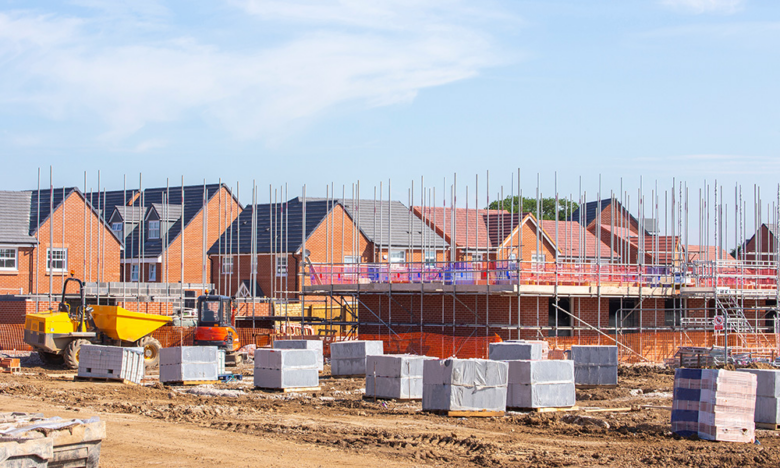
Do I need a survey when buying off-plan?
With housebuilders often offering incentives to purchase new-build properties, their popularity continues to grow, but if you’re offered the opportunity to buy off plan, what does this mean, do you need a survey? And what do you need to know before proceeding?
What is buying off plan?
Buying off-plan means you purchase your home before the developer has finished building it, possibly even before construction has begun. You will likely need to pay a deposit to secure the property. By opting to secure your home at this stage, you may be able to have input on fixtures and fittings, layout and even choose the specific plot you want, but you will have a potentially lengthy wait until you can move into your new home.
What are the pros and cons of buying off-plan?
Buying off the plan can seem like a risky move – you’re committing a lot of money to something you can’t see, and you may not know much about the company building your new home. There are, however, several benefits that come with buying a new build.
The biggest benefit is that your home will be brand new and designed to suit your taste and lifestyle. This means you won’t have to plan to do any major work on your property when you move in, so you don’t have to add these costs to your buying budget.
There are also several government initiatives that may apply to you when you buy off the plan. For example, the First Homes scheme can help you to buy a new build at 30% to 50% less than its market value if you’re a first-time buyer in England. Many developers will also offer incentives such as a 5% deposit or paying your stamp duty. New builds also come with a 10-year warranty as standard. This can provide peace of mind to buyers, but be sure to read the terms carefully as they often aren’t as extensive as expected.
Those buying off plan do, however, need to be prepared for a lengthy wait between paying the deposit and moving into the property. This could be a year or more if construction is yet to start. This can also impact other areas of the purchase; for example, most lenders don’t offer specific off-plan mortgages, and standard agreements are only valid for six months. In more volatile markets, it may also be the case that house prices fall in the time that you’re waiting to move in. Another factor to consider when buying off-plan is what stage the rest of the development is at. If you’re the first to commit, you could find yourself living on a building site for a while.
Questions to ask when buying off plan
It’s safe to say, then, that it’s worth doing your research before committing to buy off plan and don’t be afraid to ask questions, such as:
Does the developer have a good reputation?
While your developer will likely give you a glossy brochure full of pictures of stunning houses and happy customers, don’t just rely on this. Check customer satisfaction levels online, look at their social media and visit other developments they’ve completed if there are any nearby. This will help you develop a more rounded view of the company and its operations. It’s also worth confirming that your deposit is protected if the developer goes bust.
Will there be estate management charges?
Many new-build developments are privately managed, so there may be charges for maintaining shared spaces, even if you’re buying a freehold property. Ask in advance about any charges so you can budget for them.
What’s included in the price?
This may seem like an obvious question, but it’s important that you’re clear about exactly what’s included and that any extras you’ve negotiated have been noted. You may also have to pay extra for certain fixtures and fittings, such as carpets or turf in the garden, especially if you deviate from the standard specification.
When will I be able to see the property?
You’ll undoubtedly be excited to follow the journey of your property’s build, but it’s also important to have a realistic timescale in place so you can plan the rest of the purchase. It’s also worth asking for a date when you’ll be able to get a surveyor around to thoroughly inspect the property before you complete.
What happens if the project is delayed?
No matter how realistic the deadlines given by the developer seem, it’s a good idea to ask what would happen if these dates were missed. If the long-stop date – the date by which they must have finished the work – is missed, you may be eligible for compensation. Also, ask about timelines for the rest of the development so you know how long you’ll be living on a building site.
Do I need a survey when buying off-plan?
While you may expect a new property to be in perfect condition and think your warranty will cover any issues that arise, this often isn’t the case. For this reason, a specially designed survey along with a snagging list is to be recommended. Ideally this should be scheduled before you move in so the developer can rectify any issues before you live in the property. However, this is usually not possible when buying off plan as you will exchange before the property is complete. The survey should therefore be booked as soon as the work is finished.It’s also worth asking for a snagging provision to be included in your contract so if you find any future issues; they’ll be sorted.
By getting a specialist survey and snagging list you can be confident that issues of all sizes and seriousness will be picked up and you’ll have a professional report and photographic evidence of any issues that you can then show your developer to encourage them to fix the work promptly.
As the newbuild home warranty only covers defects for the first two years after completion and as key aspects such as plumbing, electrics and gardens are not covered – and other areas only if the builder is deemed not to have complied with National House Building Council’s Technical Requirements – a survey continues to be valuable when buying off the plan.
To find out more about Novello’s services for newbuild properties, including snagging lists and Homebuyer Surveys, contact us or arrange a free quotation now.

